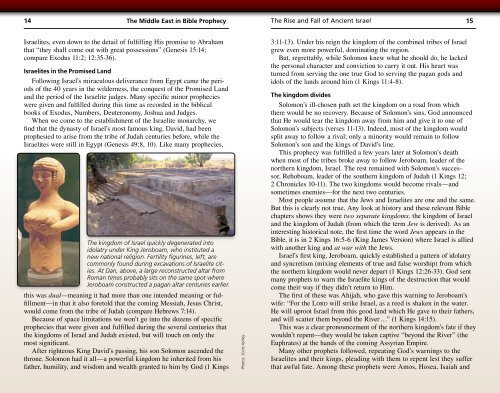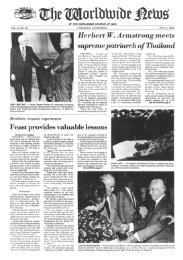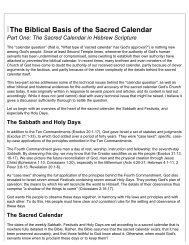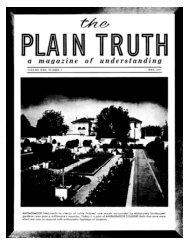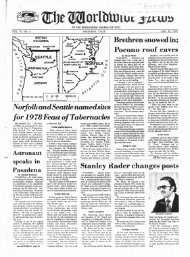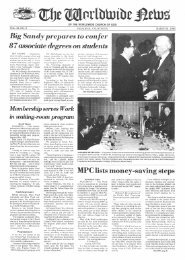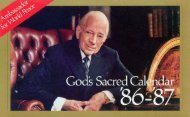The Middle East in Bible Prophecy - United Church of God
The Middle East in Bible Prophecy - United Church of God
The Middle East in Bible Prophecy - United Church of God
Create successful ePaper yourself
Turn your PDF publications into a flip-book with our unique Google optimized e-Paper software.
14 <strong>The</strong> <strong>Middle</strong> <strong>East</strong> <strong>in</strong> <strong>Bible</strong> <strong>Prophecy</strong> <strong>The</strong> Rise and Fall <strong>of</strong> Ancient Israel<br />
15<br />
Israelites, even down to the detail <strong>of</strong> fulfill<strong>in</strong>g His promise to Abraham<br />
that “they shall come out with great possessions” (Genesis 15:14;<br />
compare Exodus 11:2; 12:35-36).<br />
Israelites <strong>in</strong> the Promised Land<br />
Follow<strong>in</strong>g Israel’s miraculous deliverance from Egypt came the periods<br />
<strong>of</strong> the 40 years <strong>in</strong> the wilderness, the conquest <strong>of</strong> the Promised Land<br />
and the period <strong>of</strong> the Israelite judges. Many specific m<strong>in</strong>or prophecies<br />
were given and fulfilled dur<strong>in</strong>g this time as recorded <strong>in</strong> the biblical<br />
books <strong>of</strong> Exodus, Numbers, Deuteronomy, Joshua and Judges.<br />
When we come to the establishment <strong>of</strong> the Israelite monarchy, we<br />
f<strong>in</strong>d that the dynasty <strong>of</strong> Israel’s most famous k<strong>in</strong>g, David, had been<br />
prophesied to arise from the tribe <strong>of</strong> Judah centuries before, while the<br />
Israelites were still <strong>in</strong> Egypt (Genesis 49:8, 10). Like many prophecies,<br />
<strong>The</strong> k<strong>in</strong>gdom <strong>of</strong> Israel quickly degenerated <strong>in</strong>to<br />
idolatry under K<strong>in</strong>g Jeroboam, who <strong>in</strong>stituted a<br />
new national religion. Fertility figur<strong>in</strong>es, left, are<br />
commonly found dur<strong>in</strong>g excavations <strong>of</strong> Israelite cities.<br />
At Dan, above, a large reconstructed altar from<br />
Roman times probably sits on the same spot where<br />
Jeroboam constructed a pagan altar centuries earlier.<br />
this was dual—mean<strong>in</strong>g it had more than one <strong>in</strong>tended mean<strong>in</strong>g or fulfillment—<strong>in</strong><br />
that it also foretold that the com<strong>in</strong>g Messiah, Jesus Christ,<br />
would come from the tribe <strong>of</strong> Judah (compare Hebrews 7:14).<br />
Because <strong>of</strong> space limitations we won’t go <strong>in</strong>to the dozens <strong>of</strong> specific<br />
prophecies that were given and fulfilled dur<strong>in</strong>g the several centuries that<br />
the k<strong>in</strong>gdoms <strong>of</strong> Israel and Judah existed, but will touch on only the<br />
most significant.<br />
After righteous K<strong>in</strong>g David’s pass<strong>in</strong>g, his son Solomon ascended the<br />
throne. Solomon had it all—a powerful k<strong>in</strong>gdom he <strong>in</strong>herited from his<br />
father, humility, and wisdom and wealth granted to him by <strong>God</strong> (1 K<strong>in</strong>gs<br />
Photos: Scott Ashley<br />
3:11-13). Under his reign the k<strong>in</strong>gdom <strong>of</strong> the comb<strong>in</strong>ed tribes <strong>of</strong> Israel<br />
grew even more powerful, dom<strong>in</strong>at<strong>in</strong>g the region.<br />
But, regrettably, while Solomon knew what he should do, he lacked<br />
the personal character and conviction to carry it out. His heart was<br />
turned from serv<strong>in</strong>g the one true <strong>God</strong> to serv<strong>in</strong>g the pagan gods and<br />
idols <strong>of</strong> the lands around him (1 K<strong>in</strong>gs 11:4-8).<br />
<strong>The</strong> k<strong>in</strong>gdom divides<br />
Solomon’s ill-chosen path set the k<strong>in</strong>gdom on a road from which<br />
there would be no recovery. Because <strong>of</strong> Solomon’s s<strong>in</strong>s, <strong>God</strong> announced<br />
that He would tear the k<strong>in</strong>gdom away from him and give it to one <strong>of</strong><br />
Solomon’s subjects (verses 11-13). Indeed, most <strong>of</strong> the k<strong>in</strong>gdom would<br />
split away to follow a rival; only a m<strong>in</strong>ority would rema<strong>in</strong> to follow<br />
Solomon’s son and the k<strong>in</strong>gs <strong>of</strong> David’s l<strong>in</strong>e.<br />
This prophecy was fulfilled a few years later at Solomon’s death<br />
when most <strong>of</strong> the tribes broke away to follow Jeroboam, leader <strong>of</strong> the<br />
northern k<strong>in</strong>gdom, Israel. <strong>The</strong> rest rema<strong>in</strong>ed with Solomon’s successor,<br />
Rehoboam, leader <strong>of</strong> the southern k<strong>in</strong>gdom <strong>of</strong> Judah (1 K<strong>in</strong>gs 12;<br />
2 Chronicles 10-11). <strong>The</strong> two k<strong>in</strong>gdoms would become rivals—and<br />
sometimes enemies—for the next two centuries.<br />
Most people assume that the Jews and Israelites are one and the same.<br />
But this is clearly not true. Any look at history and these relevant <strong>Bible</strong><br />
chapters shows they were two separate k<strong>in</strong>gdoms, the k<strong>in</strong>gdom <strong>of</strong> Israel<br />
and the k<strong>in</strong>gdom <strong>of</strong> Judah (from which the term Jew is derived). As an<br />
<strong>in</strong>terest<strong>in</strong>g historical note, the first time the word Jews appears <strong>in</strong> the<br />
<strong>Bible</strong>, it is <strong>in</strong> 2 K<strong>in</strong>gs 16:5-6 (K<strong>in</strong>g James Version) where Israel is allied<br />
with another k<strong>in</strong>g and at war with the Jews.<br />
Israel’s first k<strong>in</strong>g, Jeroboam, quickly established a pattern <strong>of</strong> idolatry<br />
and syncretism (mix<strong>in</strong>g elements <strong>of</strong> true and false worship) from which<br />
the northern k<strong>in</strong>gdom would never depart (1 K<strong>in</strong>gs 12:26-33). <strong>God</strong> sent<br />
many prophets to warn the Israelite k<strong>in</strong>gs <strong>of</strong> the destruction that would<br />
come their way if they didn’t return to Him.<br />
<strong>The</strong> first <strong>of</strong> these was Ahijah, who gave this warn<strong>in</strong>g to Jeroboam’s<br />
wife: “For the Lord will strike Israel, as a reed is shaken <strong>in</strong> the water.<br />
He will uproot Israel from this good land which He gave to their fathers,<br />
and will scatter them beyond the River …” (1 K<strong>in</strong>gs 14:15).<br />
This was a clear pronouncement <strong>of</strong> the northern k<strong>in</strong>gdom’s fate if they<br />
wouldn’t repent—they would be taken captive “beyond the River” (the<br />
Euphrates) at the hands <strong>of</strong> the com<strong>in</strong>g Assyrian Empire.<br />
Many other prophets followed, repeat<strong>in</strong>g <strong>God</strong>’s warn<strong>in</strong>gs to the<br />
Israelites and their k<strong>in</strong>gs, plead<strong>in</strong>g with them to repent lest they suffer<br />
that awful fate. Among these prophets were Amos, Hosea, Isaiah and


